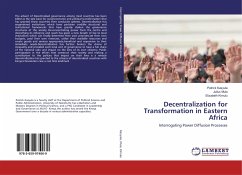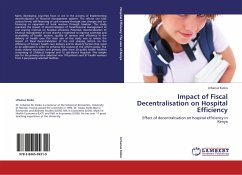The advent of Decentralised governance among most countries has been billed as the sole basis for social-economic and political transformation that has granted those countries their conducive systems. Decentralisation has engendered institutions which have partaken credible structural and institutional frameworks that have greatly shaken the governance structures of the society. De-concentrating power form the centre and diversifying its influence and reach has given a new breath of live to local institutions which can finally determine their own priorities,set their own budgets, pool their own revenues, utilize their available resources and create goods and services appropriate,beneficial and responsive to their immediate needs.Decentralization has further broken the chains of inequality and provided each local unit of governance to have a fair share of the national cake and impact on the lives of its own citizenry. Public participation in the affairs that construct their society and making a contribution to the policies that impact on their lives is a miracle decentralization has granted to the citizens of decentralized countries with Kenya's Devolution case a real time landmark
Bitte wählen Sie Ihr Anliegen aus.
Rechnungen
Retourenschein anfordern
Bestellstatus
Storno








